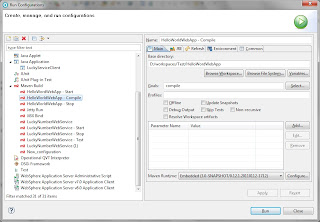Problem: Plugin {plugin name} or one of its dependencies could not be resolved: Failed to read artifact descriptor for {plugin name}: Could not find artifact {plugin name}
[INFO] -----------------------------------------------------------
[INFO] BUILD FAILURE
[INFO] -----------------------------------------------------------
[INFO] Total time: 0.079s
[INFO] Finished at: Tue Feb 05 12:14:23 CST 2013
[INFO] Final Memory: 5M/8M
[INFO] -----------------------------------------------------------
[ERROR] Plugin org.jibx:maven-jibx-plugin:1.2.4-SNAPSHOT or one of its dependencies could not be resolved: Failed to read artifact descriptor for org.jibx:maven-jibx-plugin:jar:1.2.4-SNAPSHOT: Could not find artifact org.jibx:maven-jibx-plugin:pom:1.2.4-SNAPSHOT -> [Help 1]
Cause: The repository does not contain the plugin.
Solution: Add the <pluginRepositories> sections in the pom.xml file.
pom.xml
<pluginRepositories>
<pluginRepository>
<id>sonatype-nexus-snapshots</id>
<name>Sonatype Nexus Snapshots</name>
<url>https://repository.sonatype.org/content/groups/public/</url>
<snapshots>
<enabled>true</enabled>
</snapshots>
</pluginRepository>
</pluginRepositories>
<repositories>
<repository>
<id>sonatype-nexus-snapshots</id>
<name>Sonatype Nexus Snapshots</name>
<url>https://oss.sonatype.org/content/repositories/snapshots</url>
<releases>
<enabled>false</enabled>
</releases>
<snapshots>
<enabled>true</enabled>
</snapshots>
</repository>
</repositories>







